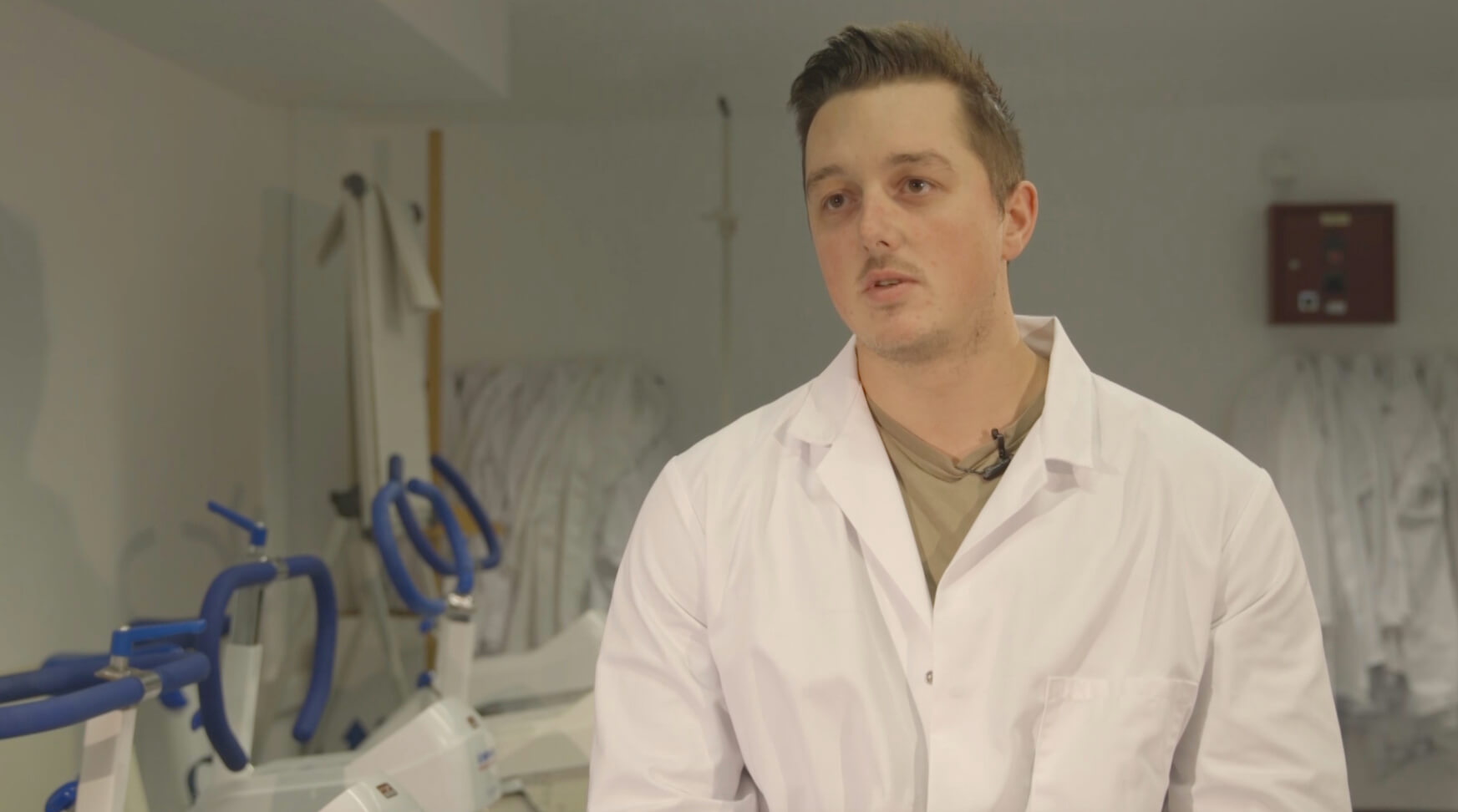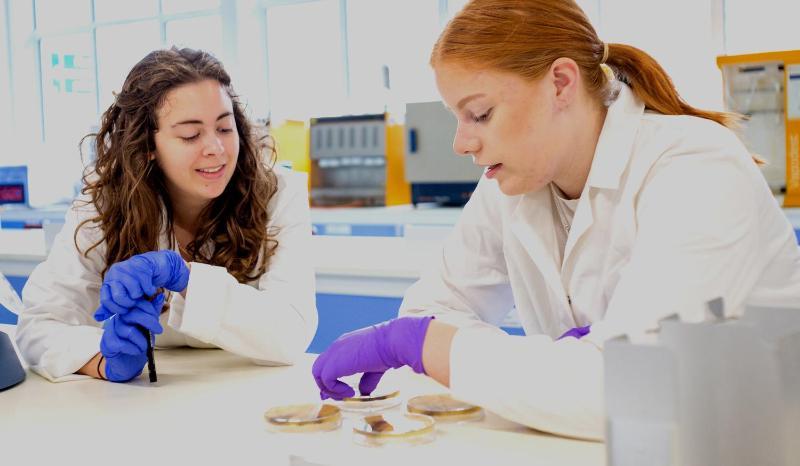Human Nutrition
BSc (Hons)
Undergraduate degree - single honours
- UCAS codes: Institution B20, Course B400 or 70W5 (with professional placement year)
- Human Nutrition - Programme Document
- Award
- BSc (Hons) Human Nutrition
- School/s
- School of Sciences
- Campus or location
- Newton Park
- Course length
- Three years full time, or four years full time with professional placement year. Part time available.
- UCAS codes
- Institution Code: B20
- Course Code: B400 or 70W5
- Campus Code: A,BSU
Entry requirements
We accept a wide range of qualifications for entry to our undergraduate programmes. The main ones are listed under 'Typical offers' in the main column below. For combined courses, please check both subjects. If your qualification is not listed, please email admissions@bathspa.ac.uk with your specific details.
Explore the scientific principles behind human nutrition, food, health and disease.
- Gain additional letters after your name on graduating from this Association for Nutrition accredited course.
- Tailor your degree through module, dissertation and work placement choices relevant to your aspirations.
- Join our close-knit community of staff and students and experience support that students have described as "exceptional".
#2 in the UK
for Satisfaction with Teaching in Nutrition and Food Science (Guardian University Guide 2025)
#1 in the South West overall
for Nutrition and Food Science (Guardian University Guide 2025)
#4 in the UK
for Student Experience in Food Science (Sunday Times Good University Guide 2025)
#4 in the UK
for Satisfaction with Course in Food Science (Complete University Guide 2025)
Developed in consultation with industry employers, Human Nutrition at Bath Spa has been designed to equip graduates for careers in diverse industries, ranging from health and food to education and clinical nutrition.
When you graduate from this externally accredited programme, you’ll be eligible for Registered Associate Nutritionist status, allowing you to use the letters A. Nutr. after your name.
With expert advice from our dedicated tutors, you’ll be able to tailor your degree through your module choices, dissertation, and work placements that are relevant to your career or further study aspirations.
“Studying at Bath Spa helped me to realise where I wanted to be, and I couldn't be happier with my current job. I feel very proud to be working at a hospital as well-respected as Salford Royal.”
Lucy Blackstone, BSc (Hons) Human Nutrition
What you'll learn
This course provides an approach to nutrition that is based on the scientific and academic principles of biology, biochemistry, social and public health aspects of human nutrition as well as observing the principles of food resources, food development and safety.
By studying human nutrition, you’ll understand the scientific principles underlying nutritional requirements throughout life, in health and disease.
Year one
You’ll be introduced to a broad range of subjects underpinning the study of nutrition. Emphasis is given to key skills including communication (both written and oral), problem solving and the use of a range of laboratory and ICT techniques, including specialist diet analysis software.
Year two
You’ll build on your knowledge from year one and apply it to aspects of human nutrition, investigating the role of diet and physical activity in health and as a risk factor in health disorders. Importantly, you’ll gain an understanding of the ethical and professional framework you'll work within as a graduate of a Human Nutrition degree. You’ll be trained in research methodology and increasingly, you’ll become an independent and autonomous learner.
You’ll explore future careers through an optional, but encouraged, work placement in year two.
Year three
In your final year, you’ll critically explore the complex nature of issues related to epidemiology, dietary intake, exercise and the acquisition of human health. The primary research investigation is an important part of your studies in year three, and this will enable you to integrate the practical and theoretical aspects of diet, nutrition and ethics.
Many assessments set in Human Nutrition mimic tasks, ways of working, or reporting that are used by professional practitioners. We think that you should experience these ways of working as they help you to prepare for employment, be that in industry, the health sector, as a consultant, teacher or researcher. Some examples of methods used for assessment on this programme include:
- Dietary analysis
- Reports
- Diet and physical activity evaluations
- Developing food products
- Essays
- Case studies
- Seminar presentations
- Examinations
- Group work
- Literature reviews
- Dissertation.
You’ll be taught by a core lecturing team, as well as a number of visiting experts who take lectures and seminars on their areas of expertise.
You’ll learn through participation in lectures, seminars, case studies, practical workshops, and educational visits.
We place emphasis on independent study. Each week you’ll be given a clear indication of the follow-up study and preparation you are expected to undertake.
To find out more about how we teach and how you'll learn, please read our Learning and Teaching Delivery Statement.
Course modules
This course offers or includes the following modules. The modules you take will depend on your pathway or course combination (if applicable) as well as any optional or open modules chosen. Please check the programme document for more information.
- Biological Techniques
- Introduction to Biochemistry
- Food and Nutrition
- Nutrition and Exercise for Health
- Anatomy and Physiology
- The Microbial World
- Research Skills for Human Nutrition
- Human Nutrition
- Human Pathophysiology and Nutrition
- Food Analysis
- Future Food: Food and Nutrition in the 21st Century
- Food Product Development
- Microbial Applications and Biotech
- Environmental Management
- Biology Work Placement
- Health: Mind, Body, Society
- The Marketing Business
- Science Journalism and Publishing
- Professional Placement Year
- Human Nutrition Dissertation Planning
- Nutrition and Exercise Science
- Human Nutrition Dissertation Publication
- Epidemiology and Public Health
- Food Safety
- Global Trends in Food, Preservation and Packaging
- Food and Nutrition in Practice
- Medical Biology
- Plants and People
- Environmental Practice
- Publishing Industry Project
- Successful Freelancing
- Advanced Topics in Psychology
Opportunities
As part of your degree, you could study abroad on a placement at one of Bath Spa’s partner universities.
Factory visits are part of the optional second year module Food Product Development. Visits have included trips to:
- Marshfield Bakers
- Marshfield Ice Cream
- Bath Brew House
- Wyke Farms
We encourage our students to attend external events such as:
- The Bath Science Fair
- The Bristol Science Fair
- IFST career launchpad event at Campden BRI
- The Nutrition Society conferences
- Food Matters Live event
- IFST annual lecture
We also encourage our students to attend as many endorsed events or activities that they can e.g. Nutrition Society training events and IFST endorsed activities.
Our students have undertaken work experience and voluntary work with organisations including: MEND; NHS; Sirona Health Care; School Food Trust; schools; youth groups; The Stroke Association; British Heart Foundation; Julian House; local charities; and action groups.
In the third year you can take the (optional) Food and Nutrition in Practice module where you’ll work on a brief developed with an external organisation/industry. Project providers for this module include Marshfield Bakery, BirdsEye Foods, NHS, Heart UK, and Food and Nutrition Live.
Human Nutrition graduates have gone into a number of graduate careers including:
- Dietetics (after a postgraduate dietetics programme)
- Working in the food industry in new product development, and as technologists and sensory analysts
- Secondary school teaching - Biology (after PGCE)
- Master's programmes in specialisms such as nutrition and sport or physical activity
- PhD study and post-doctoral research
- Working in public health for councils or local organisations
- Graduate health and wellbeing advisors
- Self-employment
If you’re a full-time undergraduate student starting your first year at Bath Spa University, you can apply for the Certificate in Global Citizenship, which you’ll study alongside your degree.
You’ll gain global awareness and add an international dimension to your student experience, and funding is available. On successful completion of the programme, you’ll be awarded a Certificate in Global Citizenship. This is in addition to your degree; it doesn’t change your degree title or results.
Develop a wealth of indispensable digital skills that you can take into your future career. One of only three Adobe Creative Campuses in the UK, we provide all Bath Spa students with access to the full Adobe Creative Suite, giving you the tools to communicate creatively, whatever your course or chosen professional field.
Professional placement year
The Professional Placement Year (PPY) provides you with the opportunity to identify, apply for, and secure professional experience, normally comprising one to three placements over a minimum of nine months. Successful completion of this module will demonstrate your ability to secure and sustain graduate-level employment.
By completing the module, you'll be entitled to the addition of 'with Professional Placement Year' to your degree title.
Before your PPY, you'll work to identify roles of interest and secure a placement. The Placements Team will support through timetabled sessions and 1:1 appointments.
As well as completing a minimum of 900 placement hours, you will complete two assessments demonstrating your skill development, growth in professional behaviours and how the PPY has impacted your future career aspirations.
Aiming to make work experience more accessible, we have introduced the PPY Bursary. Students undertaking a PPY can receive between £500 and £1,500 to be used towards placement costs such as travel, food, workwear or accommodation.
For more information and details of eligibility criteria, please visit the PPY Bursary webpage.
“As I had such a good experience at Bath Spa during my degree, I decided to go back to complete a PGCE in Secondary Science. I am now a full-time Science teacher... and I love being able to inspire the next generation and share my knowledge and interests.”
Emma Pegler, BSc (Hons) Human Nutrition
Facilities and resources
As a Human Nutrition student you’ll be taught at Newton Park campus. You’ll benefit from our specialist facilities, giving you access to some of the latest technologies and learning resources, including a wide range of industry standard specialist food and nutrition software.
You'll have access to:
- Teaching laboratories
For biochemistry, human biology, microbiology and food analysis - Low hazard laboratory
For food preparation (kitchen facilities), sensory analysis and physiology (including exercise equipment) - Analytical suite
For instrumental analysis - Research and project space
- Resources Room
Student Open Access study space - Virtual Learning Environment
- Commons building
- Newton Park library.
The laboratories and workshops are fully equipped with a mix of general and specialist equipment, appropriate for modules taught in them, student dissertations and staff research. Students have personal on-campus access to dietary analysis software, which is used frequently in lectures and seminars.
Fees
| Student | Annual tuition fee |
|---|---|
| UK full time | £9,250 |
| International full time | £16,905 |
Professional Placement Year
During the placement year, the fee is reduced to 20% of the full time fee. This applies to UK and EU/International students.
- UK: £1,850
- International: £3,381
Additional course costs
You may need to pay additional course costs over and above your tuition fees, for example, for specialist equipment or trips and visits. Please check the course Programme Document (linked under the main image on this page) for details of any additional costs. You can also read our Additional Course Costs Policy for further information.
“The one-to-one tutor contact was exceptional; I felt supported and always knew there were people I could turn to for every type of help and advice.”
Lucy Blackstone, BSc (Hons) Human Nutrition
Interested in applying?
We’re looking for individuals who are enthusiastic and excited about human nutrition. You will have, or are working towards, a qualification in Biology, Biological Science, Physical Education or a related subject. You’ll be motivated and willing to participate in the course, as well as take advantage of what Bath Spa University has to offer its students.
We accept a wide range of qualifications for entry to our undergraduate programmes. The main ones are listed below:
- A Level - grades BBB-BCC including a grade B in Biology, Human Biology, Biological Sciences, Social Biology, or Physical Education.
- BTEC – Extended Diploma grades from Distinction Distinction Merit (DDM) to Distinction Merit Merit (DMM) in a related subject.
- T Levels – grade Merit preferred in a relevant subject.
- International Baccalaureate – a minimum of 32 points are required with a minimum of grade 5 in Biology or a related subject at Higher Level.
- Access to HE courses – typical offers for applicants with Access to HE will be the Access to HE Diploma or Access to HE Certificate (60 credits, 45 of which must be Level 3, at Merit or higher) in a science or related subject.
If you don’t meet the entry requirements above, we may be able to accept your prior learning or experience from outside of formal education. See our Accreditation of Prior Learning (APL) page to learn more.
English Language Requirements for International and EU Applicants
IELTS 6.5 - for visa nationals, with a minimum score of IELTS 6.0 in each element.
Course enquiries
For further information about the programme or entry requirements, please email us at admissions@bathspa.ac.uk.
Ready to apply? Click the 'apply now' button in the centre of this page.
Need more guidance? Head to our how to apply pages.
Course leader: Tracey Lewarne
Email: t.lewarne@bathspa.ac.uk
"I recommend Bath Spa University because it is quite small and friendly. The lecturers are always willing to help."
Adele Mildon, BSc (Hons) Human Nutrition



